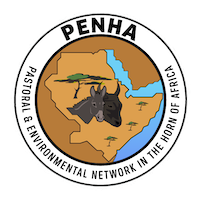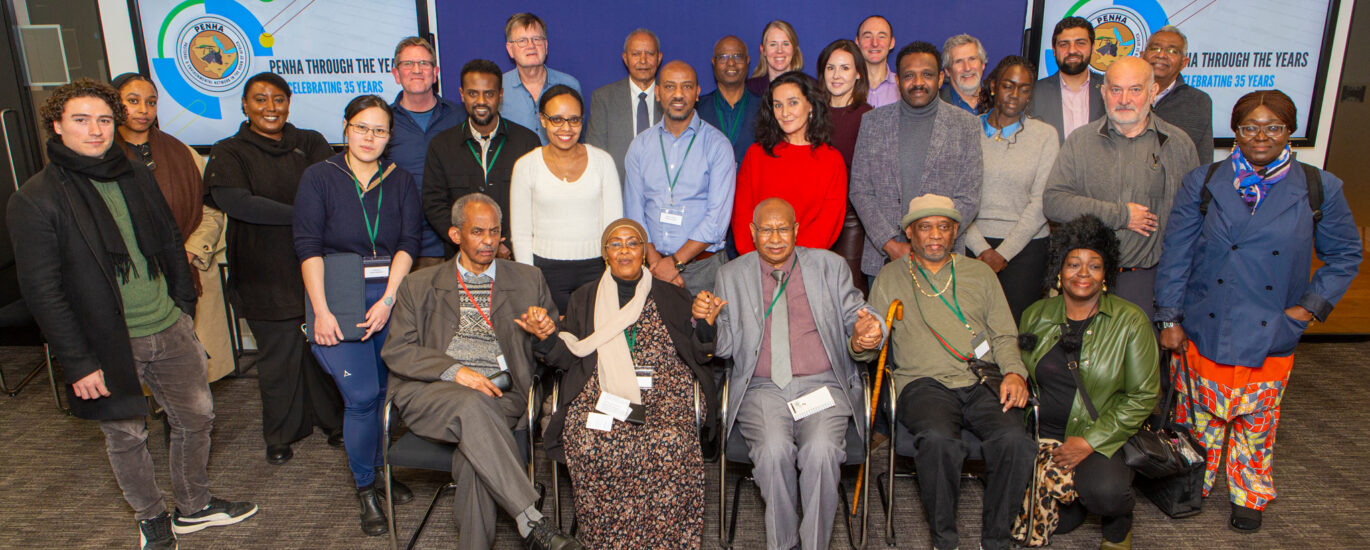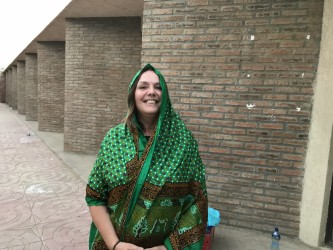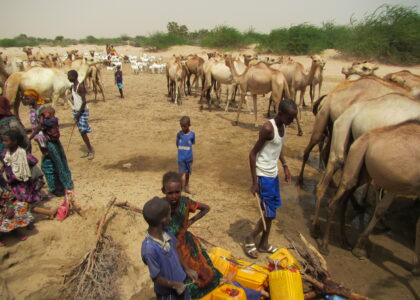In November 2024, PENHA (the Pastoral & Environmental Network in the Horn of Africa) celebrated 35 years of research, advocacy, and support for pastoralist and agro-pastoralist communities in the Horn of Africa. To mark this achievement milestone PENHA, in conjunction with The Regional Centre for Training and Development of the Civil Society (RCDCS) in Sudan, held a half-day conference on the theme, ‘PENHA Through The Years (1989-2024)’. The event, held on 26th November 2024, was hosted by ODI – the Overseas Development Institute. See the brief report on the event below. PENHA and RCDCS thank all the speakers, participants, the PENHA Board of Trustees, London and regional offices staff members, the organising committee, ODI, AIL TV, and its crew for contributing to the conference’s success and outcomes.
Welcome
PENHA’s 35th Anniversary Conference was opened by one of our Trustees, Ms. Rhoda Ibrahim. She has been involved with PENHA since 1991 and is also the Coordinator of the Somali Advice and Forum of Information (SAAFI).
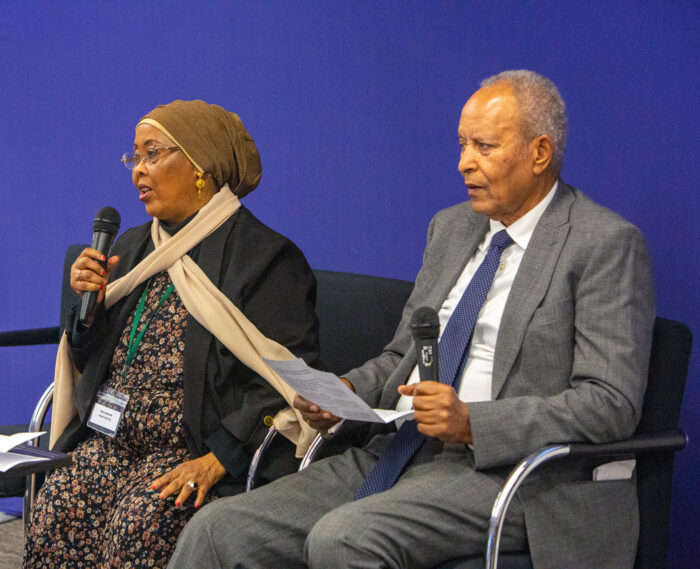
Ms. Rhoda Ibrahim, PENHA Trustee and Dr. Tekeste Ghebray, former IGAD executive secretary
Keynote Speech
Rhoda welcomed the first keynote speaker, Dr. Tekeste Ghebray (MSc, PhD), the former Intergovernmental Authority on Development (IGAD) executive secretary and the FAO representative for Iraq and Afghanistan. He informed the audience that this was PENHA’s Coral anniversary.
“PENHA was founded on the principles of focusing attention and advocacy for pastoralists and the environment. For centuries, the pastoral communities of the Horn of Africa have thrived in harmony with their environment, crafting a way of life that is as adaptive as it is enduring. Yet they were seen as simply people who liked to wander around harsh environments with their families and animals. Not anymore, PENHA helped to change attitudes. Today, we recognise that legacy and perseverance. We acknowledge the wisdom embedded in traditional practices, Zeremariam and team call it knowledge sovereignty, the courage to adapt to change, and the foresight to build systems that bridge the old and the new.
“Pastoralism is a way of reading the land, listening to its needs, and responding with care. Pastoralists have long understood the value of biodiversity, the importance of sustainable land management, and the need to adapt to an ever-changing climate. They have survived for generations in often harsh environments. As we mark this anniversary, let us celebrate not just the years that have passed but the brighter future that lies ahead — one shaped by your vision, strength, and unwavering dedication to the Horn Region.”
‘Some reflections on PENHA’s achievements and struggles in serving pastoralist communities in the Horn of Africa’
Dr Zeremariam Fre (MSc, PhD, FGR), the PENHA Founder and an Associate Professor in the Development Planning Unit, Faculty of the Built Environment at University College London, outlined the reason for PENHA’s formation. Although the Horn is a zone of conflict, it is important not to lose hope. There are common identifiers that can help in addressing the region’s many challenges. That sharing of knowledge and experience is reflected in the PENHA logo, which omits the political borders of the Horn.
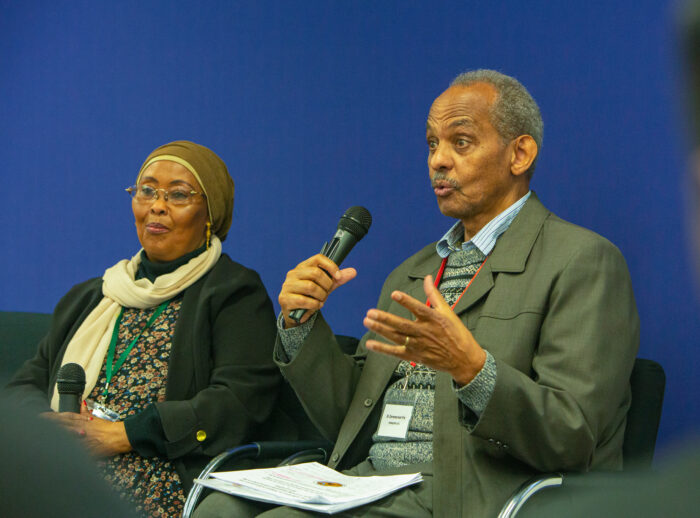
Ms. Rhoda Ibrahim, PENHA Trustee and Dr. Zeremariam Fre, PENHA Founder and Trustee
The initial plan was for PENHA to be a regional institute of excellence in the area of pastoralism and related matters. Unfortunately, politics and conflict made this idea untenable, but the network idea has been an enduring structure that has enabled PENHA to undertake its goals. Unplanned urbanisation is increasingly becoming a major issue impacting pastoralists’ livelihoods. The region produces some of the most high-yielding animals, such as camels, cattle, sheep and goats.
PENHA has always centred its role on indigenous knowledge systems and the need for value-added benefits to reach the communities at the core of these practices. That should also be reflected in the role that pastoralists can play in contributing to academic and scientific research. Trade is also an area where pastoralists can do better. Dr Fre highlighted the importance of livestock trading through Berbera port in Somaliland to the Middle East but they are selling their stock at a low price compared to what they can fetch once in the Middle East. Other challenges affecting the region include: conflict, the persistence of invasive species, land grabbing, climate change and displacement. There is a need for pastoralists to generate income from a diversity of sources and gain benefits from the use of new technology. Today, there is increasing female participation in the region’s economic life, which is to be welcomed and essential for the future stability of pastoralism.
‘PENHA in the Region: History, Programs & Future Directions’
This session was chaired by Dr John Morton, Professor of Development Anthropology, Livelihoods and Institutions Department, Natural Resources Institute, University of Greenwich. He has been involved with PENHA for over three decades and is a former PENHA Trustee.
There was a video presentation from PENHA regional staff – Amsale Shibeshi, PENHA Regional Programmes Coordinator; John Livingstone, Regional Research and Policy Officer, PENHA Ethiopia; and Sadia Ahmed, Country Representative, PENHA Somaliland/Somalia – which outlined PENHA’s activities and areas of research which reflect PENHA’s core principles.
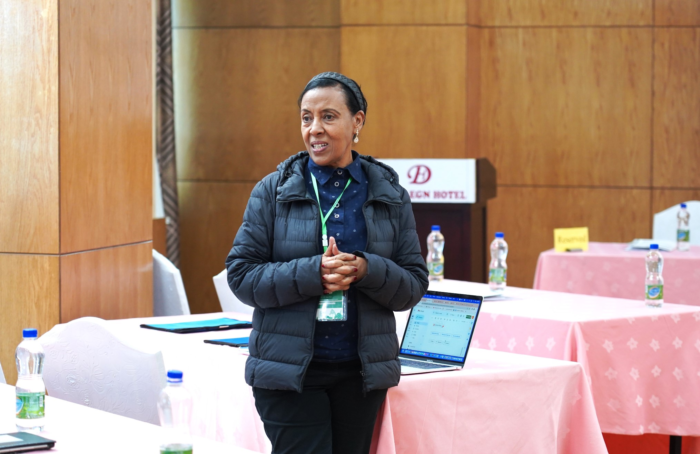
PENHA’s Regional Programme Coordinator, Amsale Shibeshi. Photo: PENHA
Amsale Shibeshi pointed out that central to PENHA’s aims and objectives is a belief in the need for participatory and bottom-up approaches. ‘PENHA believes in “African solutions”; locally owned development; the building of local capacity; the legitimacy of pastoral livelihoods; and gender equality. New emphases include enterprise promotion and youth employment. We combine research and project implementation, so that each informs the other. Research strengthens the work on the ground, and insights from project experience feed into research and policy work.
‘PENHA began as a network of British and Horn of African academics and practitioners, established in 1989, working closely with the UK’s ODI and IIED. PENHA established a regional office at Addis Ababa University in 1992, staffed by experts from all of the Horn countries, with a sub-office in Asmara, Eritrea. PENHA also collaborated closely with Mekelle University since its inception. After the Ethio-Eritrean war in 1998, PENHA was forced out of Ethiopia. PENHA subsequently worked through regional offices in Hargeisa (Somaliland), Khartoum (Sudan) and Kampala (Uganda). In each country, PENHA has a small core staff, supplemented by a network of specialists who come in as needed.
‘PENHA has a number of international partners. We work with British universities, mainly UCL, and universities across this region. We have had close relationships with FAO and GIZ, as implementing partners. We have done baseline studies and analysis for them and organized workshops and training events. We are also members of FAO’s Pastoralist Knowledge Hub and CELEP. PENHA’s collaboration with Tropenbos International (TBI) of the Netherlands has been very fruitful over recent years. These international partnerships are vital. They enable PENHA to draw on and contribute to the latest research and analysis, and they help PENHA to have a stronger voice in policy debates.
‘PENHA’s London office has played a central role in developing these international collaborations, and the London base remains vital. The London office provides a link to European development debates and the growing Diaspora. It also helps to ensure that PENHA maintains a region identity.
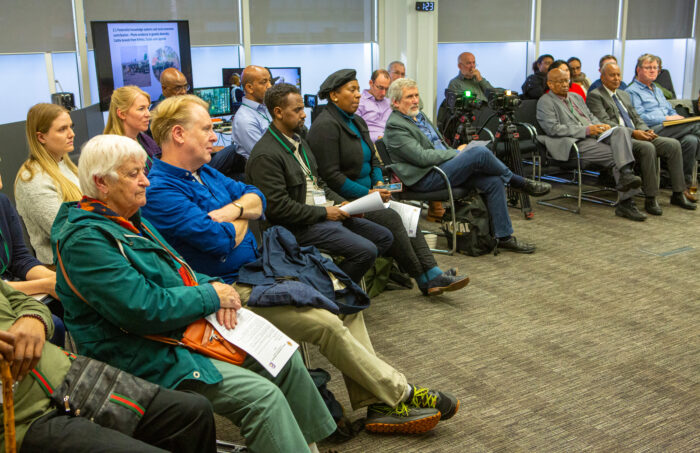
PENHA’s funding sources over the years have included FAO, GIZ, the Somaliland Development Fund, DFID/FCDO, UNEP, UNIDO, and DANIDA. Recent projects have included PENHA’s book on Ethiopia’s safety net programme, highlighting the need to integrate existing social capital into safety net programmes and adopt a much more participatory approach. ‘The PSNP involves an approach similar to what we have tried to do with FAO in Somaliland – putting money in people’s pockets and building environmental infrastructure for the long-term with cash-for-work. But in Somaliland, the strength of traditional institutions and the use of digital technology, with biometrics and digital cash transfers, made implementation much more effective.’
PENHA-Somaliland has been our largest project implementation area since 2001. ‘PENHA has carried out a number of GESI studies for SDF, supporting the design of government programs in the agriculture, livestock, fisheries, transport, and water sectors. Currently, PENHA-Somaliland is also working with the Government of Djibouti to develop a Prosopis control and use program. Our Seawater Greenhouse Project in Berbera is the first of its kind in the region. It was designed by Charlie Paton of Seawater Greenhouse Ltd UK. It uses solar-powered desalination for horticulture and salt production. With NIVA of Norway, we are trying to adapt it to extract minerals, such as lithium, from seawater.’
PENHA-Ethiopia ‘has worked with TBI and CIFOR-ICRAF to develop a national drylands restoration strategy, integrating trees, crops and livestock with livelihoods and inclusive value chain development at the centre. This has been officially endorsed by the government. PENHA and our partners are now implementing the strategy on the ground in Tigray and Afar regions. It adapts to and mitigates climate change, enhances the ecosystem services that underpin the livelihoods of farmers, agro-pastoralists and pastoralists, while increasing local incomes through value chain development and private sector engagement.
‘CIFOR-ICRAF’s RRC model involves establishing tree nurseries as commercially self-sustaining centres for the production and sale of quality planting materials. The Abogerebs (“Fathers of the Trees”) association of elders from Tigray and Afar are important partners, overseeing natural resource management and conflict resolution. The nursery in Tigray, which is managed by women, supplies planting materials on a commercial basis and is building the capacity to be a supplier to the Prime Minister’s large-scale tree planting “Green Legacy Initiative”.
‘In 2024, PENHA collaborated with Halo Trust to implement a project that brought de-mined land back into productive use in Somaliland. We are exploring the possibility of implementing a similar project in war-affected Tigray.’
After the video screening, Rita Lambert, Associate Professor in the Development Planning Unit, Faculty of the Built Environment at University College London, joined Dr John Morton in highlighting some salient points. He said the video was a great testament to many achievements in such a challenging area. Conflict and climate change were identified as key areas for the future. He noted the range of publications produced to share pastoral knowledge systems, which led to advocacy and policy change.
For Rita Lambert, the key thematic areas highlight the need for a holistic approach as they are deeply interconnected. In the context of climate change and ongoing conflict, these thematic areas are weaponised to dominate and exploit. Rather than looking at peacebuilding as an entry point, this needs to be implemented throughout all themes to restore peace and justice. She stressed the need to find the strategies and methodologies which work best – learning from other countries such as Rwanda for conflict management. PENHA is well placed to help with this by acknowledging traditional ways of life and valuing their knowledge whilst maintaining cultural identities.
On the issue of livelihoods, Dr John Morton observed that it was great to see value added in the country for livestock. He noted that some small-scale vendors are very resilient and contribute to pastoralist livelihoods.
SPIDA Book Launch
The launch of the paperback version of ‘Social Protection, Pastoralism and Resilience in Ethiopia: Lessons for Sub-Saharan Africa’, published by Routledge, was Chaired by Professor E John Wibberley, PhD, NSch, FRAgS, FIAgrM, Professor of Comparative Agriculture & Rural Extension at The University of Reading and The Royal Agricultural University Cirencester.
The number of pastoralists in Africa has been estimated to be 268 million, with 12% of Ethiopia classed as pastoralists or agro-pastoralists.
Two PENHA members involved in researching and overseeing the project gave presentations from their chapters. First up was Dr Zeremariam Fre (MSc, PhD, FGR), the Principal Investigator and Consortium Leader. Funding for the project came from the Netherlands Organisation for Scientific Research (NWO). The authors were from Adigrat University in the Tigray Region, Samara University in the Afar Region, and the Development Planning Unit at UCL and PENHA, with a strong focus on those based in the Horn Region. Support was provided by partners such as Addis Ababa University.
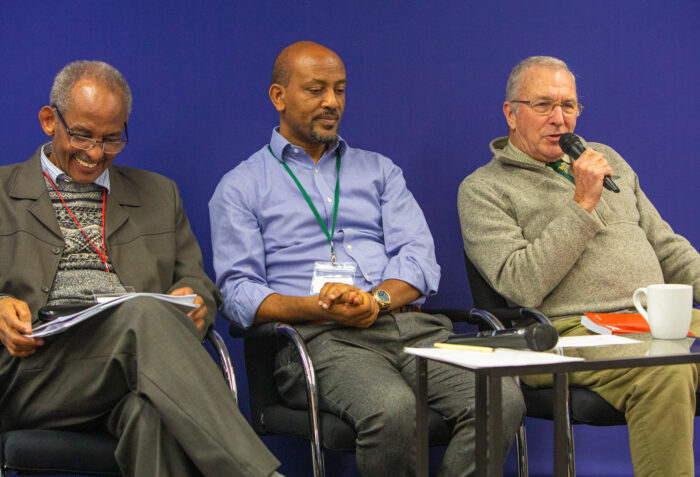
Dr. Zeremariam Fre, PENHA Founder, Trustee and book editor; Dr. Bereket Tsegay, PENHA Senior Researcher and Policy Analyst; and Professor E John Wibberley, University of Reading and The Royal Agricultural University Cirencester
Ethiopia has one of the largest UN-funded social protection schemes in Africa. This research focused on the scheme’s impact on pastoralists in the Afar Region. This was less effective in the lowland areas because the scheme was designed for sedentary populations and didn’t consider pastoralists’ migratory lifestyles. The Indigenous survival strategies could be integrated into the national scheme. In the Afar Region, 1.5 million people live in 270,000 sq/km.
The programme is seasonally determined, but pastoralists and farmers operate on different timescales throughout the year. Food aid given to pastoralists did not help them increase the value of their assets or consider the diversity of their income generation. Among the other findings was the role of the informal sector needed to be fully recognised. Also, there is the ongoing marginalisation of women and youths in policy development and delivery. The research has been shared with policymakers at the national and federal levels. Hopefully, the findings can feed into other social protection policy schemes across the continent.
JW highlighted that his review of the SPIDA book appeared in Agriculture for Development. He stressed the need for private-public partnerships to make the schemes more successful.
Dr Bereket Tsegay, author and PENHA Senior Researcher and Policy Analyst highlighted the chapters explaining the rationale for social protection schemes and what the future holds. Firstly, the schemes proactively address issues of weak resilience capacity. There is a need for long-term planning and not just for government and agencies to react to crises such as floods, drought and conflict after they have arisen. This will mean they are better prepared and more effective. Sometimes, support such as fertilisers is given cynically to gain support from recipients around election time.
If governments have established social protection programmes, they can get around some of the donors’ fears about corruption and inefficiency. The three types of social protection intervention are: a) Consolidated – which is more long-term and is seen in Western countries; b) Emerging – which is common in Latin American countries; c) Limited social protection – where there is a growing interest in safety nets but it is not fully established even among countries such as Ethiopia which have 20 years of programmes.
Mozambique considers social protection a human right, while other countries consider it within the context of social development. Social protection can include food aid, planned work for pay, and vouchers. There are concerns among some recipients about the volatility of cash payments, which can quickly reduce purchasing power. There are both conditional and unconditional schemes; for instance, a child may have to attend school or be vaccinated for the parents to be eligible for the support. Long-term support may be given to lactating women, the elderly or those with disabilities.
Historically, there exists strong family and community support in times of crisis, so even when people do qualify for social protection, it is rarely for them individually or as a nuclear family unit. This means the schemes need to feed into achieving the UN Sustainable Development Goals and be part of a national development strategy. Dr Tsegay was recently undertaking research in Lesotho, and the people there said they had learnt much from looking at the Ethiopian experience of using work as a safety net.
Issues around affordability and what happens when external funding for the schemes is removed have arisen. Do the institutions have the capacity to manage these schemes? This feeds into concerns about family-level performance assessment. Technology offers opportunities to assist with rolling out of the schemes using M-Pesa style e-cash. There can also be online registration of people who will be eligible in times of crisis. Dr Tsegay highlighted that exclusion and dependency are not just on the ground in Ethiopia but even among the research community. The hardback copy of the SPIDA book is priced at over £100, while the paperback version is around £40. PENHA argued that more affordable copies should be made as the price alone excludes many of the people who could be the beneficiaries of these and similar social protection schemes.
Panel discussion on ‘Challenges and Prospects for Sustainable Peace in the Horn of Africa’
This session was chaired by Professor Mutaal Girshab, Director of The Regional Centre for Training and Development of Civil Society (RCDCS) in Sudan. Contributions came from Peter Marsden, the Chief Executive of Concordis International and Ahmed Soliman, a Senior Research Fellow in the Africa Programme at Chatham House.
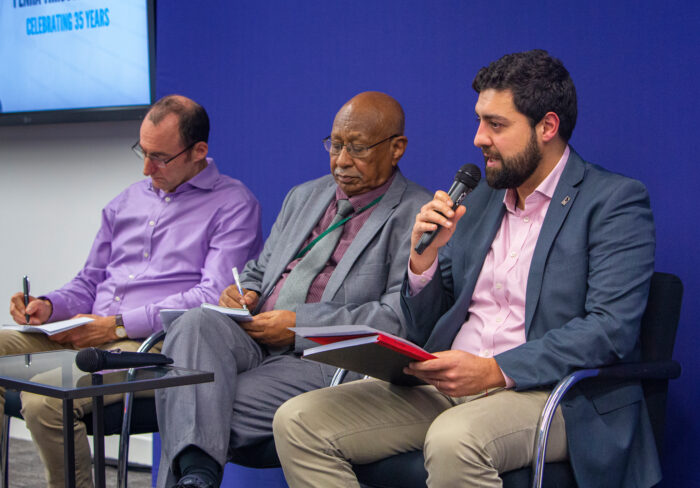
Peter Marsden, the Chief Executive of Concordis International, Professor Mutaal Girshab, Director of RCDCS in Sudan and Ahmed Soliman, a Senior Research Fellow in the Africa Programme at Chatham House.
Professor Girshab observed that the Horn of Africa is one of the world’s most unstable regions. So far, no efforts have brought sustainable peace and stability to the region. The speakers discussed the challenges and prospects of creating a regional road map. The current Sudanese conflict has been ongoing for 19 months. This has led to large-scale internal displacement and a migratory refugee problem. Along with infrastructure destruction, there is also the shattering of livelihoods. External players also have a role in fueling the conflict through their self-interest.
PENHA Trustee Rhoda Ibrahim pointed out that Somalia has been completely unstable for over three decades. Given the scale of the animosity, she asked whether Sudan could end up like Somalia. Ahmed Soliman considered the recent Somaliland elections, which showed the peaceful transfer of one party to another, to be a positive step.
Peter Marsden highlighted the role of resources such as gold, diamonds and livestock in driving conflict. He said that if we consider a conflict between a herder and a farmer, there is a choice – taking up arms or negotiating. Our role is to give them better options and choices. The choices don’t have to just be at the government level e.g. parents can decline or negotiate rather than sending their children to join the military as a simplistic example.
Dr Bereket Tsegay wanted to see local solutions for local problems but asked what the role of IGAD is in preventing conflict and what local solutions are being suggested. Peter Marsden pointed out there are also choices for the diaspora to make e.g. what they praise and share on social media etc. There are lots of options for using power and resources.
Closing Remarks.
PENHA’s 35th Anniversary Conference ended with Dr Fre thanking old and new friends for their attendance, particularly the younger generations from the Horn and the PENHA Trustees. The discussions will feed into the development of PENHA’s new strategy.
Photo credits: Unless specified, photo credit goes to Pete O’Shea.
